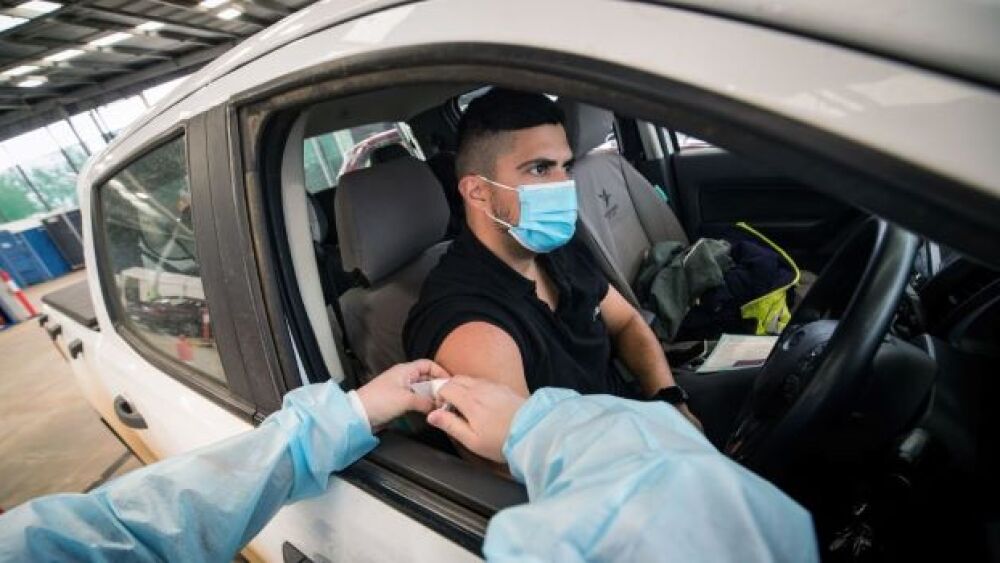As COVID-19 vaccines near full approval by the U.S. FDA, Dr. Anthony Fauci expects several organizations across the country, including businesses and schools, will issue their own vaccine mandates before people can enter their establishments.
A nurse administers the Pfizer COVID-19 vaccine at a drive-thru vaccination center. (Darrian Traynor/Getty Images)
As COVID-19 vaccines near full approval by the U.S. Food and Drug Administration (FDA), Dr. Anthony Fauci expects several organizations across the country, including businesses and schools, will issue their own vaccine mandates before people can enter their establishments.
These mandates will occur at the federal level, but Fauci suggests vaccine approval will motivate many groups to issue vaccination requirements before people can return to indoor activities. These groups might include restaurants, movie theaters, universities and schools.
Fauci told USA Today on Friday: “They can say: ‘If you want to come to this college or this university, you’ve got to get vaccinated. If you want to work in this plant, you have to get vaccinated. If you want to work in this enterprise, you’ve got to get vaccinated. If you want to work in this hospital, you’ve got to get vaccinated.’”
Earlier this month, New York City became the first government in the U.S. to require vaccination before people could return to indoor dining, gyms and entertainment venues. Mayor Bill de Blasio announced the plan, which will start on August 16. Enforcement of the vaccine mandate will begin September 13, however, and will be presided over the city’s health department versus the New York City police force.
“This is going to be a requirement,” de Blasio said. “The only way to patronize these establishments indoors, will be if you’re vaccinated—at least one dose. The same for folks in terms of work—they’ll need at least one dose.”
Dorit Rubinstein Reiss, a University of California Hastings College of Law professor, told Yahoo! Finance that questions remain regarding whether this and other similar government mandates are legal while the vaccines are under the Emergency Use Authorization (EUA). Full FDA approval will likely change the course of that argument, however.
Reiss added she expects some legal debate on behalf of the Americans with Disabilities Act (ADA), and whether the ADA takes precedent over the New York City vaccine policy, given many public places are required to accommodate people with disabilities. “Those who cannot be vaccinated should not be punished for it,” Reiss said. “I would be surprised if [New York City’s] law did not include an exception.”
While more mandates are expected across the country, Fauci doesn’t predict additional lockdowns in the near future. These lockdowns were issued early on in the COVID-19 pandemic to prevent hospitals from becoming overwhelmed and to flatten the curve.
More than 70% of adults in the U.S. have received at least one vaccine dose. As such, Fauci said the COVID-19 epidemic is primarily a concern among the unvaccinated.
“When you walk into a hospital, what you’re going to see is a lot of young people, some of whom are seriously ill, but you’re not seeing an overwhelming outstripping of the capability of the hospitals throughout the country,” he said in an interview with USA Today.
Instead, more organizations across the country will likely issue their own vaccine requirements, particularly in participation with nationwide efforts to squash the rapidly spreading delta variant.
While children younger than 12 cannot currently receive the vaccine, Fauci emphasizes everyone who works at a school needs to be vaccinated to ensure children are well protected. Masks are also recommended, he said, especially in a political climate where vaccines have become a sticking point.
“I would rather have a child be a little bit uncomfortable with a mask on and be healthy than a comfortable child without a mask in an ICU,” Fauci said. “It just doesn’t make any sense to me why you would want to not protect the children.”





